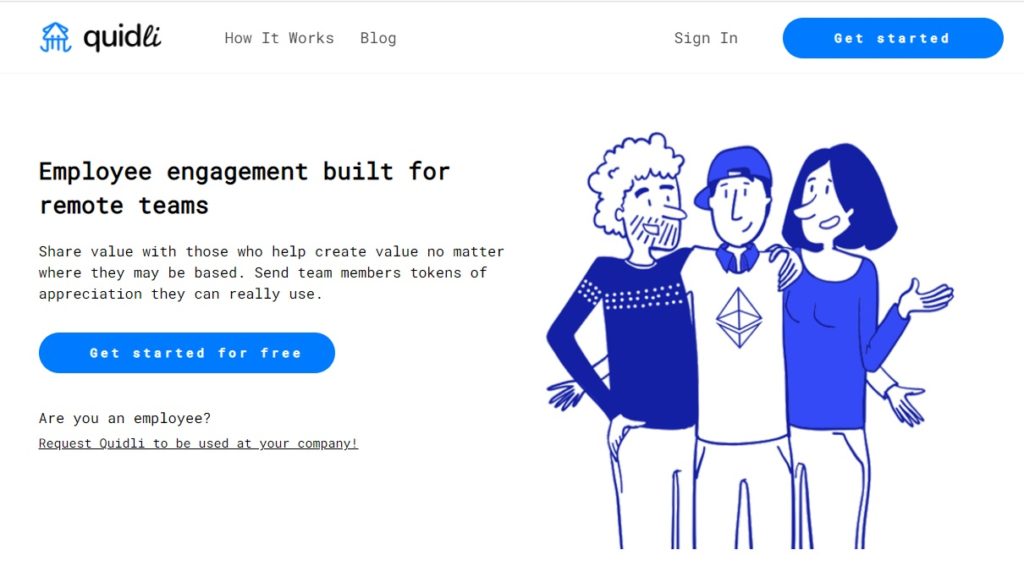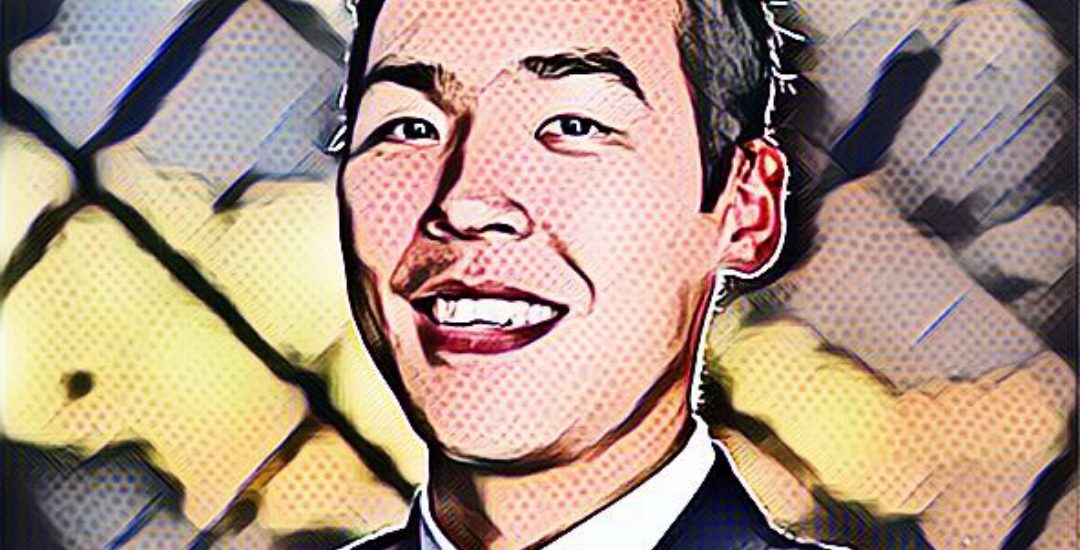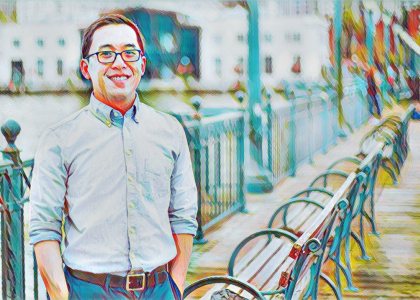Quidli is an app that helps people send small amounts of value to anyone, anywhere in the world, faster and cheaper than they can via banks and wire transfer services. Our focus today is working with remote and distributed organizations to send team members tips, rewards, and bonuses for incentivization and engagement purposes. We enable these micro-transactions by building on top of cryptocurrencies and decentralized networks.
Justin Ahn is the face behind Quidli and is here to answer our questions on his entrepreneurial ventures.

How did you come up with your product idea? Was there another person or a situation in your life that made you want to create it?
My co-founders and I are big believers in the ‘doers and makers being owners’ philosophy that becomes more plausible in the digital age. As such, our vision from Day 1 has been to improve compensation and incentivization tools for employees and contributors. The initial product we released was ESOP infrastructure on the blockchain to make smoother and more transparent employee equity so that companies and workers can focus on building rather than worrying about alignment. We ultimately couldn’t convince enough companies to experiment with their equity structures. We did learn that employee compensation in general is highly inefficient for both companies and workers. We tried swapping equity for bitcoin and discovered that some remote teams found it useful for sending flexible amounts to employees no matter where in the world they may be based.
How is your product different or unique?
We consider Quidli different from other employee engagement tools because our rewards are more than just virtual points that are arbitrarily given some internal value at an organization. By using cryptocurrencies like Bitcoin, Ethereum, Dai and USDC, we enable recipients to get real, portable value they can choose to either hold/save or use however they want. Though different from company equity, where any increases in value can be directly attributed to a team’s efforts, crypto like Bitcoin and Ether are still relatively young and have immense potential to increase in value. For people already engaged in the growing digital economy, we provide more flexibility and options for both senders and recipients to be still relatively early adopters in this rapidly growing space.
Is this your first entrepreneurial venture?
Quidli is the second startup venture I’ve launched as a founder.
Was there anything in your past (childhood, young adulthood) that made you a better entrepreneur?
I don’t have any experiences from my youth that I’d consider particularly entrepreneurial or indicative of later becoming an entrepreneur. However, I do think that playing in, participating in organized sports and activities taught me a lot about working hard and collaborating with others, which are both necessary traits for an entrepreneur to have. Team sports, particularly when played at relatively high levels, are a major way for kids to gain exposure and learn insights into what it’s like working in high pressure environments and having to deal with both success and failure, which are equally inevitable.
Tell me a bit about your past as you see relevant (where are you from, where did you go to school?)
I grew up in the US east coast, in Maryland, in a suburb of Washington, D.C., and attended the University of Maryland. The big entrepreneur profiles being celebrated on campus then were Sergey Brin (Google) and Kevin Plank (Under Armour), who’d both done their undergrad at UMD. After finishing school, I moved to Asia where I worked in financial services at KPMG Advisory and later helped launch e-commerce ventures for Rocket Internet. I went back to school for an MBA at HEC Paris and have remained in France where I’ve since worked in SaaS, edtech, and currently crypto. Having lived in five different countries in the past 12 years, I’ve directly experienced a lot of friction with international banking and financial services, and this informs a lot of my bullishness in crypto and its future.
Tell me a bit about you. (Hobbies, favorite entertainment, favorite vacation spots)
I’ve been married for five years, and my wife and I have two kids. This doesn’t leave us much time for hobbies, but I try to get exercise mostly via running, which is something I’ve enjoyed doing since high school. My family and I also like going camping. I’ve found it’s a great activity for young families as it enables us to get out of the city, spend time outdoors, and travel more within France. Another thing I’ve learned to enjoy since living in France is drinking wine, particularly reds.
When did you decide to become an entrepreneur? What were the circumstances in your life at the time?
Frankly speaking, I never thought about starting my own business when I was younger. As a senior at university, my focus was on getting an analyst job in finance or consulting (like pretty much everyone else). But joining venture studio Rocket Internet, I was really influenced by their strong culture of entrepreneurship and success, and found I really enjoyed operational work during a startup’s early stages. And given that those early ventures I worked on were successful (2 exits, 1 failure), I’ve been inspired ever since to replicate that success as a founder myself. It may seem obvious, but it’s really infectious when you work in environments that demand excellence and when you’re surrounded by people that are all committed to execution and progress.
Tell me a bit about your company or team (do you have any other people working with in team or you working all by yourself?)
I started Quidli with an MBA classmate – we were interested in startups and got into bitcoin together while at school in 2013; we had complementary profiles, ex-Rocket and YC alum, so when we were both available and mutually expressed interest in crypto again in 2018, we ran with it. Then there’s co-founder, Guillaume Figielski, who’s a major crypto enthusiast and the man behind the tech at Quidli. Additionally, we have a team member in Europe and another in North America. And as a remote team, we’ve been able to work with over 30 contributors around the world on a mission basis. It’s a massive advantage to leverage when you’re distributed, to be able to connect and collaborate with people who share your interests and vision.
Did you invest any money in your business? Were there others that funded it?
In the beginning, any necessary expenses were paid for by the founders and sometimes by contributors too. The general policy was that we pay for what was absolutely necessary. But the great thing about building software/an internet venture is that it’s relatively not capital intensive. You can move and build pretty fast, even at an early stage, without spending a lot of cash. I think setting expectations and being honest about capital requirements, especially in the beginning, is important and is a talk you should have with business partners as early as possible so as not to lead to surprises or resentments later when things may seem tough or less exciting compared to when starting out.
What helps you to stay on your path and follow your goal during the tough time?
Definitely having some kind of system of accountability helps when you’re managing any kind of venture or initiative at the early stages. Myself, I’m a fan of using OKRs to stay focused and goal oriented. In my opinion, it’s useful to have a structure, expectations that are fixed, but to be flexible enough with the results, positive and negative, to be able to advance and adjust, as necessary. As such, I like to use a kind of modified, shorter-term OKR framework to work and to evaluate the outcome of that work, both at the personal level and the company level.
What were the best decisions you made when you were starting your business?
One of my favorite decisions when starting Quidli was that we applied a work-for-equity system to work with as many talented people as we possibly could while bootstrapping the early development. It’s certainly not a tool that will appeal to all startups and workers, but in our case, it helped us network with creative and interesting people while also building the initial product at an accelerated rate that helped us secure our first pre-seed funding. If you’re interested in this kind of building tool, I highly recommend starting by reading Mike Moyer’s Slicing Pie as it’s a great for thinking about business collaboration and organizational incentives/motivations in the early stages. Again, it’s not for everyone in terms of application, but I do think it’s required for anyone choosing to bootstrap a business.
What were the worst decisions you made when you were starting your business?
I’d wager this is a question that’ll give many founders anxiety. Without specifics, I think the type of decisions that tend to keep me up at night are around hiring. Hiring is really challenging, and the frustrating thing is that there’s no exact science for it. Whenever you realize a hiring decision wasn’t good, then you must deal with those consequences, otherwise your business will suffer. And for me, such experiences stay on my mind. On the other hand, when a hire is great and creates value, then it really makes the whole process worthwhile. It’s been a case of live and learn, at least for me.
What advice have you found indispensable in running your business?
It’s always helpful to put things in perspective; and one point I often think of along these lines is: Most startup ventures don’t fail because of outright failing but rather because the people either lose interest or run out of the resources necessary to continue. But if you’re making serious efforts to connect with prospective users and are building products that solve real problems they have, you’re on a track that’s better than most startups. It’s largely a matter of how long you’re willing and able to grind it out until you can reach a meaningful tipping point, however you may choose to define that.
Going forward, what are your plans for this product or for other entrepreneurial pursuits?
At Quidli, we intend to continue building out features and integrations that improve accessibility to and usability of crypto, less as speculation, more as transactional. There’s still a blue ocean today in terms of entrepreneurship in the crypto space. But if your views on crypto are just on the currency and trading aspects, then the options and possibilities can only seem narrow, limited. In fintech alone, there’s so much beyond just tokens that can be done to open doors not only for digital natives, but for entire groups, who either don’t have the infrastructure to and or wouldn’t qualify for accessing the type of financial services normally reserved for high-net-worth people and organizations. But how can financial inclusion be improved if we insist on continuing to build on top the same old legacy infrastructure?
What advice do you have for entrepreneurs who just starting their journey?
It’s certainly not an easy professional choice; if it were then everyone would be doing it. If there’s any one thing I think people should internalize, it’s that there’s no fixed path, trajectory, or playbook you should be trying to follow 100%. This means that the best way to find what works, what works for you and your venture is to get your hands dirty and try things. Because just sitting and thinking about what could or couldn’t work isn’t going to get you any meaningful results, positive or negative.
What one more question would you add to this list?
“Please tell us about the time you successfully hacked some (non-computer) system to your advantage?”
While at UMD, I spent my sophomore year as a foreign exchange student in Japan. For those who may not know, vending machines are big in Japan (for drinks, snacks, meals, public transportation, etc.). When I learned that the 500 Japanese Yen coin (~5 USD) is similar in size to the 500 Korean Won coin (~0.50 USD), I made sure during a trip to Korea to stock up on a lot 500 KRW coins. Without getting into specifics, while the “hack” didn’t work every time, I was still able to eat and travel well for student standards until my supply of coins ran out a month later. Don’t ask me how much though! As you can see Justin is an interesting and thoughtful entrepreneur that is set on changing the playing field in the world of small business and micro currency.





